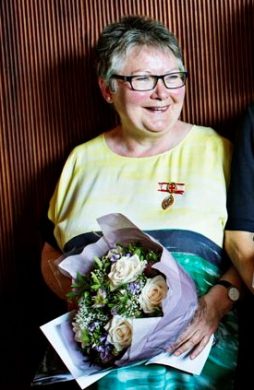Tre danske sygeplejersker, Nete Wrona Olsen, Nina Brünés og Dorrit Verding, har modtaget ’Florence Nightingale medaljen’ – en pris, som uddeles hvert andet år af Internationalt Røde Kors til sygeplejersker i verden.
Medaljen er den fineste udmærkelse, en sygeplejerske kan få. Den gives til sygeplejersker, der har “udvist exceptionelt mod og opofrelse i konflikt- og katastrofeområder eller for pionerarbejde inden for offentlig sundhed.” Siden medaljen blev uddelt første gang i 1920, har 34 danske sygeplejersker modtaget den.
Blandt de tre prismodtagere er Dorrit Verding, Holbæk, der har et vidt spændende virke bag sig i Den 3. Verden.
Dorrit Verding (f. 1948) er i dag patientrådgiver hos Region Sjælland. Hun arbejdede i en del år som nødhjælpssygeplejerske for Røde Kors.
F.eks. i Libanon under borgerkrigen, der varede fra 1975-1990. Hun var en af de eneste, der fik tilladelse til at besøge og registrere krigsfanger. Derudover har hun bl.a. været udsendt til Thailand og Pakistan.
Da Dorrit Verding kom tilbage til Danmark, blev hun headhuntet til at lede det dengang helt nystartede patienthotel på Rigshospitalet – det var et af de første eksempler på et offentligt/privat samarbejde.
Hun får Florence Nightingale medaljen på grund af sin enestående, livslange sygepleje for syge og sårede i verdens krigszoner samt for sit pionerarbejde for danske patienter med behov for rådgivning i et kompliceret sundhedssystem.
Her en oversigt over hendes internationale karriere:
October 1975 – April 1976:
The Danish Refugee Council, the island of Livø and Roskilde: Planning and implementation of care programs for 160 Vietnamese children and youngsters, all severely affected by parasites and other tropical diseases. Medical Assistance on the island of Livø every two weeks. After moving the children to Roskilde, a significant part of Dorrit Verding’s work was to integrate the children in the Danish healthcare system. This work resulted in a research project.
May 1976 – September 1976:
Danish Red Cross, Lebanon International Red Cross (ICRC): Nurse Anaesthetist and disaster relief. Four months at the Red Cross field hospital in Beirut during the civil war in Lebanon. After return, one month of administrative work at the Danish Red Cross office for international assistance.
November 1976 – July 1977:
Closure and dismantling of the field hospital (1 month.) Then “Medical Delegate” at ICRC’s office in Beirut. The work included surveys and disaster relief, reporting, dissemination of medical care to isolated populations, drug distribution, etc. As a non-Swiss citizen, Dorrit Verding was appointed a highly trusted task: identification and registration of prisoners of war and subsequent negotiations on visits and exchanges. Furthermore, Dorrit Verding was ICRC’s representative on the local and international “Medical Committees”
May 1978 – November 1979:
Sundby Hospital, Denmark In her spare time travels to: Thailand following the work of a Red Cross delegate at the border of Kampuchea. India and Nepal, as a representative of the Danish Red Cross on friendship and study visits with Nepalese Red Cross. Lebanon, as a representative of the Danish Red Cross participating in the evaluation Congress, organized by the Lebanese Red Cross. In addition, work for the Danish Refugee Council receiving the Vietnamese boat refugees in Denmark.
1.11. 1979 to 15.11. 1979:
DanChurchAid, Lebanon Sent by DanChurchAid to Palestine Red Crescent Society to discuss a proposal of Dorrit Verding taking over the management of their hospital in southern Lebanon.
19.11. 1979 to 20.12. 1979:
Danish Red Cross, Copenhagen Nursing consultant at the department for international assistance. Recruitment and deployment of a large number of medical personnel to the Kampuchean refugee camps in Thailand.
January 1980 – 25.4. 1981
Dan Church Aid, Lebanon, Palestine Red Crescent Society Chief Nurse, Nurse Educator and nurse anesthetist at the Tyre Hospital in southern Lebanon. The task involved management of the hospital, its clinics and a small nursing school with 15 students. As a result of the political situation, a permanent state of war, Dorrit Verding’s work for a large part consisted of organization and participation in medical and surgical disaster treatment.
April 1981 – July 1981:
Travel – South America Brazil: study visit to St. Antonio Pedro government hospital in Rio De Janeiro. Bolivia and Peru: On behalf af DanChurchAid, evaluation of “TV advent calendar project” among highland Indians.
May 1982-September 1982:
The Danish Red Cross, Pakistan. International Red Cross (ICRC) Head Nurse and nurse anesthetist. ICRC’s hospital for Afghan refugees in Peshawar.
October 1982 – July 1984:
Dan Church Aid, Lebanon. Middle East Council and Churches (MECC) Medical Coordinator – Head of MECC’s “Medical Activities”. MECC organized and coordinated the largest emergency medical response during and after the Israeli invasion of Lebanon in 1982. About 100 doctors, nurses, physiotherapists, laboratory technicians, etc. from 15 different countries worked at Lebanese hospitals and clinics. After 6 months, the emergency effort was discontinued and replaced by long-term projects for rehabilitation and primary health care. For much of the period Dorrit Verding held the post of NGO Coordinator.
October 1984 – January 1985:
Inter Aid International (IAI), Lebanon Regional Director, Middle East: IAI is an international relief organization with headquarters in California, operation office in Geneva and branches (fundraising) in several Western European countries, Canada, Australia and New Zealand. Geographically, recipients of IAI’s aid and development projects were spread in Africa, Asia, Latin America and Middle East. Dorrit Verding was employed as manager of IAI’s Middle East office, which had a staff of appr. 20 employees, of which appr. 1/3 were expatriates. By Dorrit Verding’s return to Lebanon, she was again appointed the post of NGO Coordinator.














